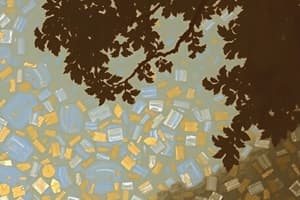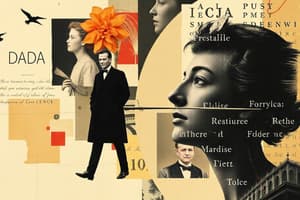Podcast
Questions and Answers
What is a primary characteristic of a short story?
What is a primary characteristic of a short story?
- It is a lengthy narrative following multiple characters.
- It is primarily fictional and lacks thematic depth.
- It explores various topics through critical writing.
- It focuses on a specific event or character. (correct)
Which theme involves the exploration of personal beliefs and values?
Which theme involves the exploration of personal beliefs and values?
- Social Commentary
- Identity and Selfhood (correct)
- War and Conflict
- Nature and the Environment
What does feminist criticism primarily address?
What does feminist criticism primarily address?
- Psychological motivations of characters.
- The economic disparities in literary texts.
- Colonial power structures in literature.
- The experiences of women and societal gender roles. (correct)
Why is historical context important in literary analysis?
Why is historical context important in literary analysis?
Which approach focuses solely on the text's internal qualities?
Which approach focuses solely on the text's internal qualities?
What thematic concern examines societal hierarchies and inequalities?
What thematic concern examines societal hierarchies and inequalities?
Which criticism explores the impact of colonial power on literature?
Which criticism explores the impact of colonial power on literature?
What does psychological criticism analyze in literary texts?
What does psychological criticism analyze in literary texts?
Which theme addresses the conflicts between individual desires and social expectations?
Which theme addresses the conflicts between individual desires and social expectations?
What literary technique enhances comprehension through imagery and symbolism?
What literary technique enhances comprehension through imagery and symbolism?
Which period is known for the emergence of the English language and religious themes?
Which period is known for the emergence of the English language and religious themes?
Which author is associated with the Renaissance period and known for explorations of human potential?
Which author is associated with the Renaissance period and known for explorations of human potential?
What characterizes literature during the 18th Century, also known as the Age of Reason?
What characterizes literature during the 18th Century, also known as the Age of Reason?
Which of the following authors is NOT typically associated with the Romantic Period?
Which of the following authors is NOT typically associated with the Romantic Period?
Which literary movement is characterized by experimentation with form and style and a reflection of modern anxieties?
Which literary movement is characterized by experimentation with form and style and a reflection of modern anxieties?
Who is an influential author from the Postmodernism period known for embracing fragmented perspectives?
Who is an influential author from the Postmodernism period known for embracing fragmented perspectives?
What theme is often explored in literature from the Victorian Period?
What theme is often explored in literature from the Victorian Period?
Which genre is characterized by written works intended for theatrical performance?
Which genre is characterized by written works intended for theatrical performance?
Which movement is primarily a reaction against the ideas of Neoclassicism, prioritizing emotion and imagination?
Which movement is primarily a reaction against the ideas of Neoclassicism, prioritizing emotion and imagination?
Which of these authors is known for contributing to Restoration comedy during the 17th Century?
Which of these authors is known for contributing to Restoration comedy during the 17th Century?
Flashcards
English Literature
English Literature
A broad collection of written works produced in the English language spanning many centuries.
Medieval Period (roughly 1100-1500)
Medieval Period (roughly 1100-1500)
A period in English literary history characterized by religious themes, chivalry, and the emergence of the English language.
Renaissance (roughly 1500-1660)
Renaissance (roughly 1500-1660)
A period marked by a renewed interest in classical learning, exploring human potential and individualism.
17th Century
17th Century
Signup and view all the flashcards
18th Century (Neoclassicism/Age of Reason)
18th Century (Neoclassicism/Age of Reason)
Signup and view all the flashcards
Romantic Period (roughly 1780-1830)
Romantic Period (roughly 1780-1830)
Signup and view all the flashcards
Victorian Period (roughly 1837-1901)
Victorian Period (roughly 1837-1901)
Signup and view all the flashcards
Modernism (roughly 1900-1945)
Modernism (roughly 1900-1945)
Signup and view all the flashcards
Postmodernism (roughly 1945-present)
Postmodernism (roughly 1945-present)
Signup and view all the flashcards
Poetry
Poetry
Signup and view all the flashcards
Feminist Criticism
Feminist Criticism
Signup and view all the flashcards
Short Story
Short Story
Signup and view all the flashcards
Essays
Essays
Signup and view all the flashcards
Biographical Criticism
Biographical Criticism
Signup and view all the flashcards
Historical Criticism
Historical Criticism
Signup and view all the flashcards
Psychological Criticism
Psychological Criticism
Signup and view all the flashcards
Marxist Criticism
Marxist Criticism
Signup and view all the flashcards
New Criticism
New Criticism
Signup and view all the flashcards
Postcolonial Criticism
Postcolonial Criticism
Signup and view all the flashcards
Love and Relationships
Love and Relationships
Signup and view all the flashcards
Study Notes
Overview of English Literature
- English literature encompasses a vast body of written works produced in the English language.
- It reflects diverse cultural, social, and historical contexts throughout history.
- It includes various genres such as poetry, drama, novels, short stories, and essays.
- Key themes and issues in English literature often mirror societal shifts, political conflicts, and personal experiences.
Historical Periods and Movements
- Medieval Period (roughly 1100-1500): Characterized by religious themes, chivalry, and the development of the English language.
- Key authors include Geoffrey Chaucer and William Langland.
- Renaissance (roughly 1500-1660): A period of revival in classical learning.
- Focus on human potential, individualism, and societal structures.
- Shakespeare is a central figure.
- 17th Century: A diverse period with various literary movements.
- Included metaphysical poets (e.g., John Donne) and Restoration comedy (e.g., William Congreve).
- 18th Century (Neoclassicism/Age of Reason): Emphasis on reason, clarity, and order in literature.
- Key authors include Samuel Johnson and Jonathan Swift.
- Romantic Period (roughly 1780-1830): A reaction to Neoclassicism, highlighting emotion, individualism, nature, and imagination.
- Notable authors include William Wordsworth, Samuel Taylor Coleridge, and Lord Byron.
- Victorian Period (roughly 1837-1901): A time of significant industrialization and social change.
- Literature often addressed social issues and moral dilemmas.
- Authors include Charles Dickens, Elizabeth Barrett Browning, and Oscar Wilde.
- Modernism (roughly 1900-1945): Reflected anxieties and uncertainties of the modern world.
- Characterized by experimentation with form and style.
- Authors such as Virginia Woolf, James Joyce, and T.S. Eliot are prominent.
- Postmodernism (roughly 1945-present): Rejection of grand narratives and universal truths.
- Focus on subjective experiences and fragmented perspectives.
- Key figures include Salman Rushdie and Toni Morrison.
Key Genres
- Poetry: Explores emotions, ideas, and experiences through aesthetic language and form.
- Drama: Written for stage performance, exploring human relationships, conflict, and societal issues.
- Novel: A longer prose narrative, tracing characters and events over time.
- Short Story: A concise narrative focused on a particular event or character.
- Essays: Non-fiction works exploring a topic through critical or reflective writing.
Important Themes and Motifs
- Love and Relationships: Exploration of love, loss, and human connections.
- Social Commentary: Critiques of social hierarchies, inequalities, and injustices.
- Nature and the Environment: Examining humanity's connection to nature and the impact of industrialization.
- Identity and Selfhood: Delving into personal experiences, values, and beliefs.
- Gender Roles: Analysis of societal expectations and limitations on men and women.
- Class and Social Divisions: Focus on the consequences of social hierarchy and economic disparities.
- War and Conflict: Examination of wartime experiences, loss, and aftermath.
- Individual vs. Society: Exploration of conflicts between individual desires and societal expectations.
Key Critical Approaches
- Biographical Criticism: Analyzing literature through the author's life and experiences.
- Historical Criticism: Considering the social, political, and cultural context of the author and their work.
- Feminist Criticism: Analyzing literature through a gendered lens, highlighting women's experiences.
- Psychological Criticism: Examining human psychology and motivations within literature.
- New Criticism: Focusing on the inherent qualities of the text itself.
- Postcolonial Criticism: Analyzing the impact of colonial power structures on societies and literature.
- Marxist Criticism: Examining the influence of economic and class structures on literature.
Studying English Literature
- Understanding historical context is key to effective interpretation.
- Paying attention to literary devices (symbolism, imagery, metaphor) deepens understanding.
- Comparative analysis across literary periods enables the identification of trends and patterns.
- Identifying thematic and structural devices aids in comprehending the essence of the literature.
- Critical analysis and discussion further enhance comprehension.
Studying That Suits You
Use AI to generate personalized quizzes and flashcards to suit your learning preferences.
Description
Explore the vast expanse of English literature, examining its rich history from the Medieval Period to the Renaissance and beyond. Delve into major authors, key themes, and the evolution of genres such as poetry, drama, and novels. Understand how social and cultural contexts influence literary works across different eras.




